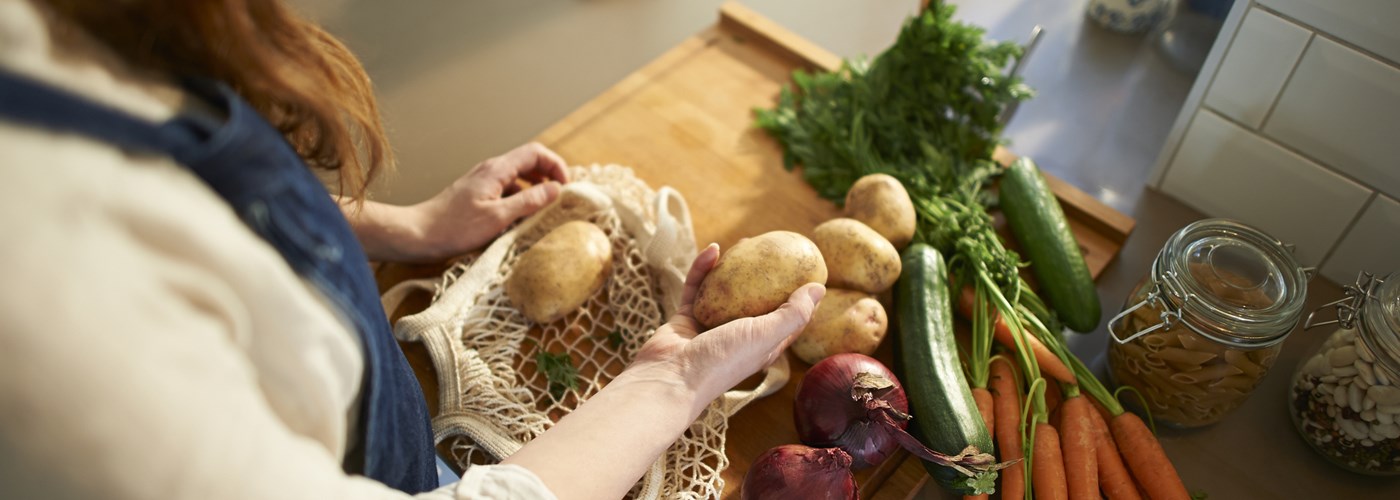12 ways to save money on your supermarket shop
Want to reduce your food shopping bills and keep your diet healthy? Try these tips to improve your budget and trolley.
1. Plan ahead
Draw up a healthy meal plan for the week and write a strict shopping list. According to the Money Advice Service, people who make a list are three times less likely to overspend than those who don’t. If you’re lacking inspiration, try BBC Good Food, Good Housekeeping or Bosh. Nutritionist Katie Peck says planning ahead is vital: “We spend more money when we buy food on a day-to-day basis than if we plan and shop once a week, with a small top-up if needed.” Benenden Health members have access to a range of delicious, simple and healthy recipes on our App and in our Nutrition hub.
2. Mix it up
Make sure there’s plenty of variety to your meals to keep boredom (and takeaway temptation) at bay – and choose healthy ingredients where possible. Why not check out our Nutrition hub and app, for recipe ideas and inspiration?
3. Waste not, want not
Research by Ocean Finance suggests good use of your freezer can be key to success. Raid the frozen aisle for budget fruit and vegetables, which can often be cheaper than fresh or tinned alternatives. Likewise, if you do buy fresh produce, consider freezing some of it. This will prevent waste and trap in some of the vitamins and minerals that would otherwise be lost.
4. Be budget savvy
If you are lucky enough to have a choice of supermarkets nearby or do your shopping online – and have a little time – price comparison website MySupermarketCompare can help you buy your shopping from the cheapest store. Always keep an eye open for offers on non-perishable goods such as chopped tomatoes or laundry liquid.
5. Eat before going
It’s been proven that if you shop when hungry, you’re at risk of spending up to 64% more on your food than you would have done if you’d eaten ahead of time. So, have a bite before you leave the house to stave off any impulse buys and to stick to your plan. If you do have to go to the shops while peckish, be aware that you will naturally be tempted into more unhealthy options.
6. Don’t be fooled by labels
Sometimes, the best value product isn’t that obvious on the shelf. Abigail Yearley from TopCashback.co.uk, explains: “Always compare the price of items by the unit. Sometimes, it can be enticing to go for the seemingly lower priced items up for grabs, however, you may be missing out on a trick. It is always better to compare the price of a product relative to the units or measurements listed on the packaging as an item that seems more expensive, may be cheaper gram-for-gram, giving you a little more bang for your buck.”
7. Hunt for vouchers
If you regularly shop at one supermarket, remember to take your loyalty card and any vouchers you’ve received. MoneySavingExpert.com is an excellent place to find the latest coupons and offers besides tips on bringing down the cost of your shopping, while services like TopCashback give you money back when you online shop through them. If your a Benenden Health member, you can also browse your My Benenden rewards, and purchase discounted gift cards for some of the UK's favourite supermarkets.
8. Take your own bags
Not only will it save the environment, but reusing shopping bags will benefit your purse too. Investing in a few really sturdy bags may reward you in other ways, too, particularly if it allows you to carry groceries home instead of having to use the car.
9. Time your trip
Savvy shoppers know when the yellow price reduction stickers will appear. These indicate items that are either about to go out of date or have been bashed a bit too much to sell at full price. The best time to grab these discounts vary from supermarket to supermarket, but MoneySavingExpert has a good guide. Don’t be led astray by these offers, though. Often it’s processed or dairy-heavy products that feature heavily in the discount session, while healthier goods have to be sought out elsewhere.
10. Look for cheaper alternatives
While you may trick yourself that a branded item is better or tastier than the supermarket’s budget version, in many cases there is little difference. The well-known brands and most expensive versions will be at eye level, so look nearby for cheaper versions and see if you can taste the difference. Don’t just assume that the brands will be more expensive, though.
11. Don't be blind with dates
Goods with the longest shelf life will be under or behind those that are soon going out of date. Have a rummage and you’ll find food you can enjoy for longer. When you get home, bring items that are going out of date soon (especially those with a ‘use by’ sticker) to the front of the shelves in your fridge to prompt you to eat these before they become inedible. If you have food that’s about to go off, try to cook it while it’s still fresh – soups and stews are a good way of stretching out vegetables beyond their best before dates.
12. Keep tabs on your budget
Some people tot up their shop as they go and some supermarkets have gadgets to help you do this (scan and shop). If you find you’re always busting your food budget, try to take a month-long view by keeping receipts and being aware of top-up trips to the shops. If you and another person share food shopping duties, make sure you’re communicating properly to avoid double-ups or excessive waste.

